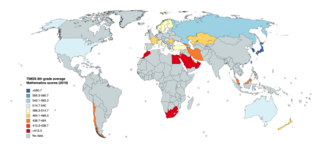Related Research Articles
In New York State, Regents Examinations are statewide standardized examinations in core high school subjects. Students are required to pass these exams to earn a Regents Diploma. To graduate, students are required to have earned appropriate credits in a number of specific subjects by passing year-long or half-year courses, after which they must pass at least five examinations. For higher-achieving students, a Regents with Advanced designation and an Honors designation are also offered. There are also local diploma options.

The education system in Switzerland is very diverse, because the constitution of Switzerland delegates the authority for the school system mainly to the cantons. The Swiss constitution sets the foundations, namely that primary school is obligatory for every child and is free in state schools and that the confederation can run or support universities.
The Iowa Assessments also known informally as the Iowa Tests, formerly known as the ITBS tests or the Iowa Basics, are standardized tests provided as a service to schools by the College of Education of the University of Iowa. Developers Everett Franklin Lindquist, Harry Greene, Ernest Horn, Maude McBroom, and Herbert Spitzer first designed and administered the tests in 1935 as a tool for improving student instruction. The tests are administered to students in kindergarten through eighth grade as part of the Iowa Statewide Testing Programs, a division of the Iowa Testing Programs (ITP). Over decades, participation expanded and currently nearly all school districts in Iowa participate annually in the program, as do many other school districts across the United States. In a cooperative relationship, participating schools receive ITBS test materials, scoring and reporting services and consultation in the use of ITBS for instructional purposes, and ITP utilizes participation by schools in research and test development. Both the ITBS and Iowa Tests of Educational Development (ITED) were revised in the 2011–2012 school year. They were rebranded the Iowa Assessments. In 2016–2017, Iowa Assessments will roll out their new testing program, Next Generation Iowa Assessments.
Mastery learning is an instructional strategy and educational philosophy, first formally proposed by Benjamin Bloom in 1968. Mastery learning maintains that students must achieve a level of mastery in prerequisite knowledge before moving forward to learn subsequent information. If a student does not achieve mastery on the test, they are given additional support in learning and reviewing the information and then tested again. This cycle continues until the learner accomplishes mastery, and they may then move on to the next stage. In a self-paced online learning environment, students study the material and take assessments. If they make mistakes, the system provides insightful explanations and directs them to revisit the relevant sections. They then answer different questions on the same material, and this cycle repeats until they reach the established mastery threshold. Only then can they move on to subsequent learning modules, assessments, or certifications.
The Colorado Student Assessment Program (CSAP) was an assessment required by the No Child Left Behind Act administered by the Unit of Student Assessment in the Colorado Department of Education (CDE). The CSAP was designed to measure how well students are learning material from the Colorado Model Content Standards, the established content standards that all Colorado public school students should learn. The CSAP only tested four of the thirteen subject areas in the Colorado Model Content Standards.
Muntinlupa Science High School, known as Muntinlupa Science or MunSci, is a special science public high school in the City of Muntinlupa, Philippines that provides a technical and science curriculum that aims to prepare students for careers in science and technology, math, and communication arts.

The IEA's Trends in International Mathematics and Science Study (TIMSS) is a series of international assessments of the mathematics and science knowledge of students around the world. The participating students come from a diverse set of educational systems in terms of economic development, geographical location, and population size. In each of the participating educational systems, a minimum of 4,000 to 5,000 students is evaluated. Contextual data about the conditions in which participating students learn mathematics and science are collected from the students and their teachers, their principals, and their parents via questionnaires.
North Miami Senior High School (NMSHS) is a public high school in North Miami, Florida, United States. Located at 13110 NE 8th Avenue, The school opened as Edward L. Constance Junior-Senior High School in 1951; with 1,500 students in 7th, 8th and 9th grades. Another grade was added each year for the next three years. The class of 1955 was the first graduating class. Early in 1955, the name of the school was changed to North Miami Senior High School. In the fall of 1955 the 7th, 8th and 9th grades were moved to the new North Miami Junior High School.
In an educational setting, standards-based assessment is assessment that relies on the evaluation of student understanding with respect to agreed-upon standards, also known as "outcomes". The standards set the criteria for the successful demonstration of the understanding of a concept or skill.
The Connecticut Mastery Test, or CMT, is a test administered to students in grades 3 through 8. The CMT tests students in mathematics, reading comprehension, writing, and science. The other major standardized test administered to schoolchildren in Connecticut is the Connecticut Academic Performance Test, or CAPT, which is given in grade 10. Until the 2005–2006 school year, the CMT was administered in the fall; now it is given in the spring.
Traditional mathematics was the predominant method of mathematics education in the United States in the early-to-mid 20th century. This contrasts with non-traditional approaches to math education. Traditional mathematics education has been challenged by several reform movements over the last several decades, notably new math, a now largely abandoned and discredited set of alternative methods, and most recently reform or standards-based mathematics based on NCTM standards, which is federally supported and has been widely adopted, but subject to ongoing criticism.
Education in the Philippines is compulsory at the basic education level, composed of kindergarten, elementary school, junior high school, and senior high school. The educational system is managed by three government agencies by level of education: the Department of Education (DepEd) for basic education; the Commission on Higher Education (CHED) for higher education; and the Technical Education and Skills Development Authority (TESDA) for technical and vocational education. Public education is funded by the national government.
TerraNova is a series of standardized achievement tests used in the United States designed to assess K-12 student achievement in reading, language arts, mathematics, science, social studies, vocabulary, spelling, and other areas.
Education in Jamaica is primarily modeled on the British education system.
Patrick F. Taylor Science & Technology Academy is a comprehensive college preparatory magnet school. In August 2004, the school opened with 7th and 8th grades and has grown to include 6th through 12th grades in recent years.

Hollygrove is a neighborhood of the city of New Orleans, Louisiana, located in the city's 17th Ward. A subdistrict of the Uptown/Carrollton area, the boundaries as defined by the New Orleans City Planning Commission are the following: Palmetto Street to the north, Cambronne, Edinburgh, Forshey, Fig and Leonidas Streets to the east, Earhart Boulevard to the south and the Jefferson Parish boundary to the west. Conrad playground, the Cuccia-Byrnes playground and Larry Gilbert baseball stadium are located in Hollygrove. The Hollygrove Market and Farm is also located in Hollygrove. Notable people including rapper Lil Wayne have grown up in the neighborhood.

Benjamin Franklin High School is a charter high school and a magnet high school in New Orleans, Louisiana. Commonly nicknamed "Franklin" or "Ben Franklin", the school was founded in 1957 as a school for gifted children. Ben Franklin is consistently named the No.1 school in the state of Louisiana and has been ranked by U.S. News & World Report as No. 15 charter school in the nation. In 1990, it moved to its current location on the campus of the University of New Orleans (UNO) in the Lake Terrace/Lake Oaks neighborhood of Orleans Parish, near Lake Pontchartrain. The school was damaged by several feet of flood water due to Hurricane Katrina in the fall of 2005, and efforts to reopen the school were covered by nationwide news agencies. The school is part of the Orleans Parish School Board (OPSB), yet it operates as a charter school and is not administered directly by the agency.
Abramson Sci Academy is a high school in the New Orleans East area of New Orleans, United States. The school is a charter school and has an open admission system.
Crescent City Schools is a charter management organization (CMO) based in New Orleans, Louisiana. Crescent City Schools is part of a movement in New Orleans to transform one of the worst school systems in the country. In the fall of 2010, Crescent City Schools received a Type 5 charter from the state of Louisiana to transform a failing school in New Orleans. In February 2011, Crescent City Schools was assigned to Harriet Tubman, a K-8 school in Orleans Parish, and assumed operations there on July 1, 2011. In 2012, the organization was awarded the expanded charter for Akili Academy of New Orleans and the charter for Paul B. Habans Elementary. Habans opened as Paul Habans Charter School in July 2013.
A high school diploma is a diploma awarded upon graduation of high school. A high school diploma is awarded after completion of courses of studies lasting four years, typically from grade 9 to grade 12. It is the school leaving qualification in the United States and Canada.
References
- ↑ Education, Louisiana Department of (2006–2007). "What is LEAP?" (PDF). Retrieved 2009-04-25.